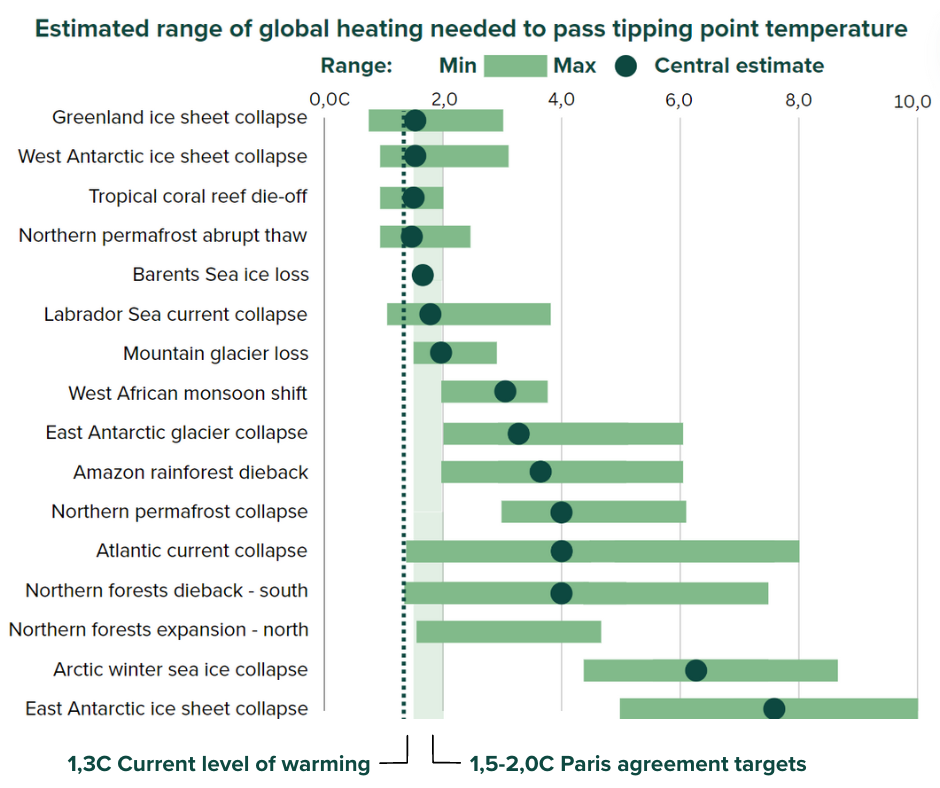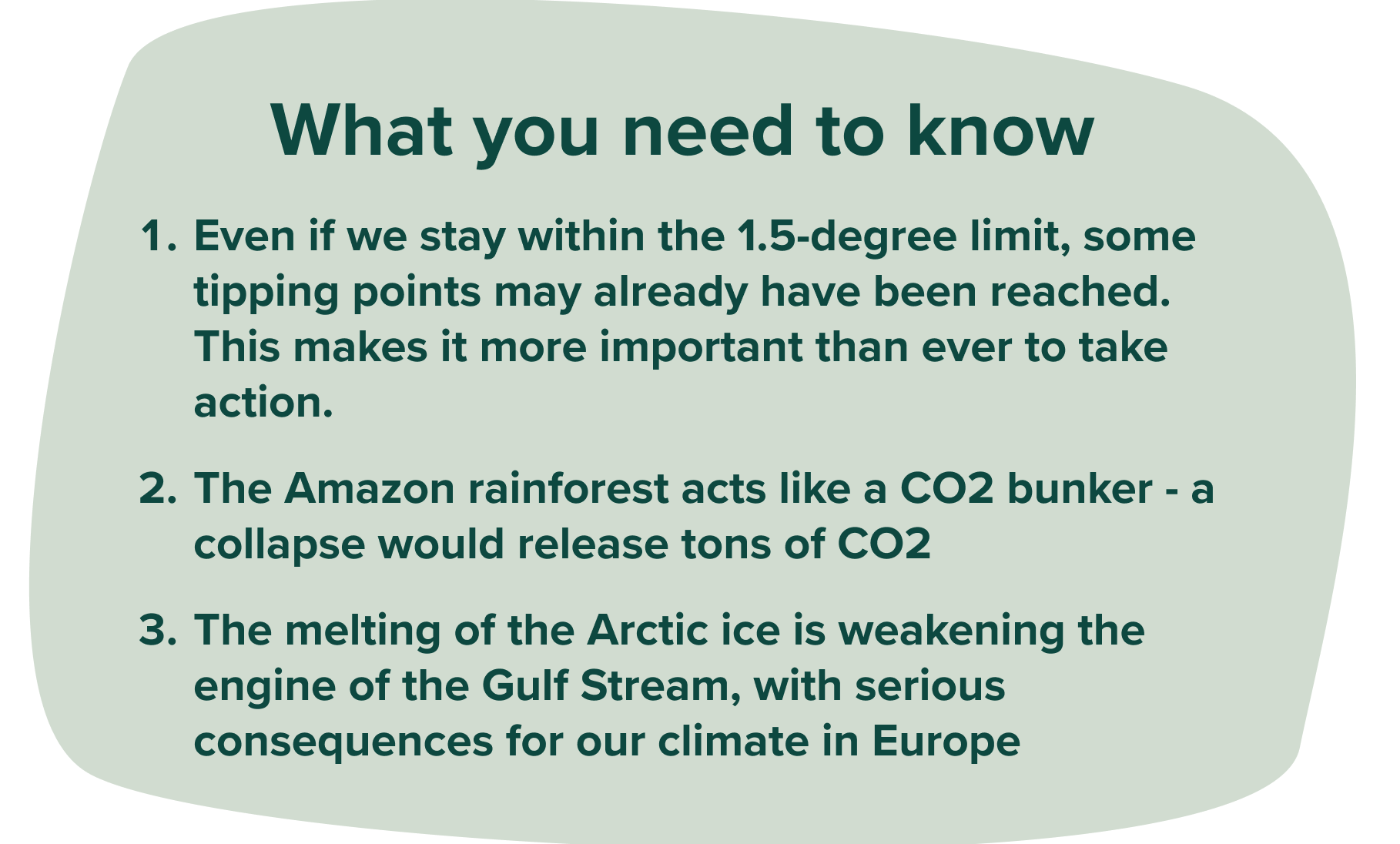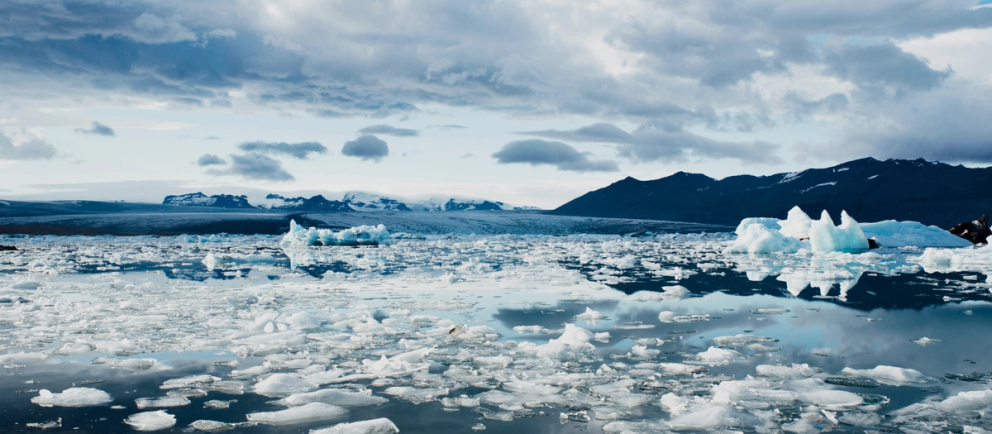The importance of understanding climate tipping points to take climate action
You probably noticed that last month was the warmest February since records began when it was possible to chill outside in the sun with only a T-shirt on. What fewer people might have noticed is that we are currently approaching some important climate tipping points on earth. The collapse of crucial ecosystems due to global warming is not distant visions of the future but could soon become reality. This post provides valuable information on the Earth's climate tipping points and highlights the urgency of taking climate action.
What are climate tipping points?
Climate tipping points are critical thresholds in the Earth's climate system. When reached, even small changes can cause big, irreversible shifts. These points can be triggered by human activities, such as releasing greenhouse gases or cutting down forests. The graphic below shows some tipping points that are in danger of being reached or surpassed. Even if we keep the global temperature rise within the limits set by the Paris Agreement, we could still hit some of these points. This highlights the urgent need to take action now to keep global warming to no more than 1.5°C above pre-industrial levels.

Team Climate graphic, Source: The Guardian
Climate tipping point: The Amazon rainforest
The Amazon rainforest dieback is one of the Earth's tipping points. If it collapses, the rainforest could turn into a savannah. Not only would thousands of species such as the jaguar or the giant otter become extinct, but tons of CO2 could also be released, as the rainforest is currently a huge carbon sink. We can all imagine the impact this could have on global warming. Whether the tipping point is passed depends on further deforestation, but also on local weather and the global climate.
Climate tipping point: Greenland ice sheet
The graph shows that even at the 1.5 degree limit parts of the Arctic, such as the Greenland ice sheet, would face collapse. This has far-reaching consequences for the inhabitants. Not only animals such as the polar bear, mountain hare or reindeer would be overwhelmed by the rapid adaptation to warming. The greed for resources freed up by the thawing of the ground is attracting large oil and gas companies. This would threaten the livelihoods of around 400,000 indigenous inhabitants.
Climate tipping point: Atlantic Current collapse
Melting Arctic ice also impacts ocean currents like the Gulf Stream. The Gulf Stream is very important for Europe: it is part of a global conveyor belt that transports warm water to the north and thus acts like a central heating system for our mild European climate. However, a recent study suggests the Gulf Stream may be nearing a tipping point sooner than expected. The Stream is driven by the differences in temperature and salt content in the seawater. When the ice sheets melt, the water temperature rises and the salt water concentration falls, which weakens the current's motor. Although the exact timing is uncertain, researchers are alarmed by the speed of approaching tipping points, emphasizing the need for immediate action to prevent collapse.
We are getting closer to the 1.5 degree limit. For the first time, our global warming averaged over 1.5 degrees over a period of twelve months compared to the pre-industrial age. We should all realize how important it is to take climate action to mitigate the effects of climate crisis.
What could be your next step? Think about how you could create more awareness about climate tipping points today. For example, you could take the topic to university, to a coffee date with your best friends or present it to your colleagues at work.
Can you imagine a glacier without ice or a rainforest without rain? Neither can we. We at TeamClimate have set ourselves the goal of giving you a voice to make a valuable contribution together. Start your climate journey now!



